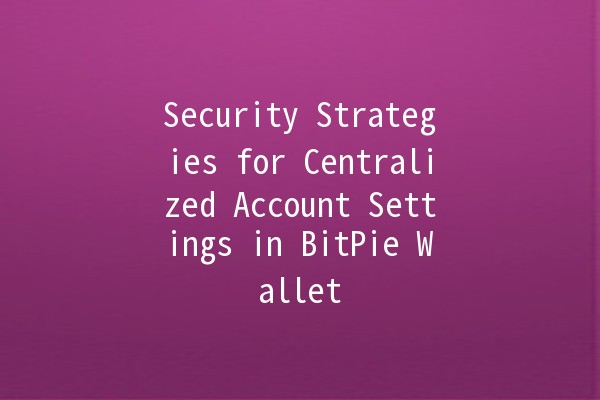
As cryptocurrencies gain popularity, the need for secure wallet solutions is more critical than ever. Specifically, centralized wallets like BitPie are often chosen for their userfriendly interfaces and ease of access. However, this convenience comes with its own set of risks. In this article, we outline essential security strategies to help users protect their centralized accounts in BitPie Wallet effectively. Whether you are new to cryptocurrency or a seasoned trader, these strategies will enhance your account's security.
Understanding Centralized Wallets
Centralized wallets store users' private keys and offer seamless access, often acting as intermediaries for transactions. While this can simplify the user experience, it also means that users must place significant trust in the service provider. Understanding these dynamics is the first step to enhancing security.
Key Security Strategies
Explanation:

Twofactor authentication adds an additional layer of security beyond just your password. It requires a second form of verification, usually through an app like Google Authenticator or a text message.
Application Example:
To enable 2FA in BitPie Wallet, go to the security settings in your account. Select the option for twofactor authentication and follow the prompts to link your authentication app. This way, even if someone obtains your password, they still won't access your account without physical possession of your verification method.
Explanation:
Your password is the first line of defense. Using a strong password, comprised of letters, numbers, and symbols, is crucial. It also should be unique, meaning it should not be used for multiple accounts.
Application Example:
Consider using a password manager to generate and store complex passwords. For instance, a password like `&9gT#pD4l8W!2xU@` combines strength and uniqueness, making it less susceptible to attacks. Regularly change your password (at least every six months) and avoid using easily guessed personal information.
Explanation:
Software updates often include security patches, fixing recently discovered vulnerabilities. Regularly updating your wallet application can prevent potential exploits.
Application Example:
Enable automatic updates on your device to ensure you're always running the latest version of BitPie Wallet. Additionally, keep your mobile operating system updated, as vulnerabilities can be present in outdated versions that malicious actors can exploit.
Explanation:
Phishing attacks can trick users into providing their account credentials by mimicking legitimate services. Awareness is key to avoiding these attacks.
Application Example:
Always verify the URL before entering your login information. If you receive an email or message that seems to be from BitPie Wallet, check for telltale signs of phishing, such as misspellings, suspicious links, or an email address that doesn’t match the official domain. If in doubt, navigate directly to the BitPie Wallet website instead of clicking links in emails.
Explanation:
Staying vigilant about account activity can help quickly identify unauthorized transactions. Regular monitoring enhances your ability to react immediately.
Application Example:
Set up alerts for any transactions sent or received on BitPie Wallet. By reviewing your transaction history weekly, you can spot discrepancies. If you notice an unfamiliar transaction, report it to BitPie support immediately.
Explanation:
For individuals holding significant cryptocurrency amounts, using a hardware wallet is highly recommended. Hardware wallets are physical devices that securely store your private keys offline.
Application Example:
Transfer your large cryptocurrency holdings to a hardware wallet like Ledger or Trezor. These devices require physical access, providing an extra layer of security against online threats.
Extras That Elevate Your Security
Besides the core strategies, consider these additional precautions for a more robust defense against potential threats:
Backup Your Wallet: Regularly back up your wallet to recover your funds in the event of device failure or loss.
Limit App Installations: Reduce the risk of malware by only downloading essential apps from reputable sources.
Educate Yourself on Security Trends: Stay informed about new security threats; knowledge is your best defense.
Use a VPN: When accessing your wallet on public WiFi, a VPN can encrypt your internet connection, protecting your data from potential eavesdroppers.
Frequently Asked Questions
If you lose your password, immediately follow the wallet recovery procedure by selecting "Forgot Password?" on the login page. You may need access to your backup recovery phrase, which is crucial for account recovery.
BitPie Wallet provides various security features, such as multisignature support and encryption. However, the safety also depends on your practices. Always follow the recommended security tips to enhance your safety.
The best wallet often depends on individual needs. Centralized wallets like BitPie are userfriendly, while hardware wallets are considered the most secure for significant holdings.
Changing your password at least every six months is advisable, especially if you engage in frequent transactions or notice any suspicious activity.
Yes, you can use BitPie Wallet on multiple devices, but ensure that you log out after each session. Using a device with updated security measures can also mitigate risks.
Immediately change your password and enable 2FA if you haven't done so. Review recent transactions and report any unauthorized activities to BitPie support to take further action.
By implementing these security strategies, BitPie Wallet users can minimize risks significantly. Cryptocurrency security can seem daunting, but by taking consistent and proactive measures, you can safeguard your assets and enjoy the benefits of this burgeoning digital economy.

